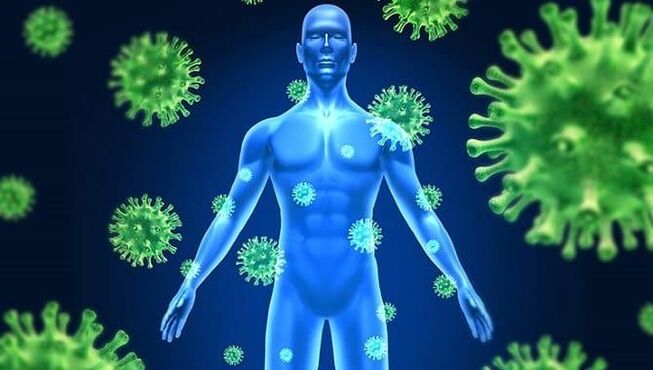Parasitic diseases are a group of pathologies caused by microorganisms, arthropods and worms. They differ in the slow process and have an impact on critical systems. Digestive system diseases, weight changes, and chronic fatigue are the main signs of the presence of parasites in the human body. In order to diagnose invasive diseases, ultrasound scans of peritoneal organs, fecal malnutrition analysis, and biochemical blood tests are required.
What parasites can a person be parasitic
The pathogens of parasitic diseases are worms, arthropods and unicellular organisms-viruses, fungi, protozoa. In 69% of cases, a worm invasion was diagnosed, caused by the following worms:
- Flukes (flukes)-schistosomes, cats and liver flukes;
- Scraper (Acanthopanax)-beaded scraper, huge comb;
- Nematode (roundworm)-hookworm, pinworm, roundworm, whipworm;
- ces (band)-wide tapeworm, cattle tapeworm, Echinococcus occidentalis.
Endoparasites dominate the invasion of worms, which are located in the small or large intestine. Common arthropod pathogens of parasitic diseases include:
- s
- ;
- reed;
- insect.
Temporary parasites include blood-sucking arthropods and water ches, while permanent parasites include lice, parasites and itchy mites. Invasive pathologies are usually caused by opportunistic fungi, protozoa-amoeba, and Lamblia bacteria.

Parasites can adversely affect the body and cause undesirable systemic effects-waste poisoning, gastrointestinal insufficiency, allergies, anemia.
Common signs of worms
Symptoms depend on the type, location and number of parasites in the body. The basis of clinical manifestations is the immune response to infection, including parasitic infection and single organ damage.
Digestive problems
Gastrointestinal diseases are mainly caused by parasites, which are located in the small intestine. Their waste can cause allergic reactions in the body, narrowing the bile ducts. As a result, there were complaints about:
- indigestion;
- Bloating
- acid
- no appetite.
More than 80% of patients suffer from constipation, diarrhea and flatulence.
stomach ache
Abdominal pain and a feeling of heaviness in the abdomen are obvious signs of internal parasites. They stimulate the receptors of the gastrointestinal mucosa and cause spastic contraction of smooth muscles. As a result, abdominal pain occurs.
If the parasite flukes act as provocateurs for invasive diseases, they can cause abdominal discomfort due to their introduction into the intestinal wall.
Anal itching
Periodic itching and painful bowel movements in the anal area are the first symptoms of internal parasites. Symptoms are mainly caused by pinworms, and less by lessers. The former lays eggs in the anus, causing severe itching.
The life span of pinworms is only 1. 5 months. The parasite egg has a protective shell, so it will not be destroyed by external factors.

Failure to observe hygiene habits can lead to self-infection and increase the number of worms in the body.
Weight change
Weight gain or loss is a clear sign of internal parasites. Weight fluctuations are caused by:
- Poisoning causes an increase or decrease in appetite;
- Metabolic disorders;
- Enteral malnutrition.
In half of the cases, patients complained of constant hunger. However, if the parasite is located in the small intestine, more than 70% of the nutrients will not enter the blood.
Blood in stool
The signs of parasitic infection depend on the pathogen of the invasive disease. The presence of blood and mucus in the stool indicates damage to the intestines:
- round bug;
- Wide ribbon
- insect.
Parasites can penetrate into the body and cause intestinal irritation. Inflammation of the wall causes bleeding and mixing of blood with feces.
Skin changes
Allergic reactions are the most obvious signs of parasites in the human body. According to statistics, large-scale invasions have caused toxic allergic reactions in 92% of patients:
- Itchy skin;
- Abscess
- Red dot;
- Yellowing
- Peeling
- Dry skin.
Yellowing of the skin indicates that bile is stagnant in the body and the activity of liver enzymes is increased.
decrease in immunity
Adult helminthiasis is accompanied by malnutrition. More than 75% of immune tissue is located in the gastrointestinal tract, therefore, parasitic diseases can lead to secondary immune deficiency. The decrease in the body's resistance to infection is expressed as:
- Often catch colds;
- Long-term healing of wounds and abrasions;
- Periodic deterioration of chronic diseases.

Parasites deplete the body's protective reserves, thereby reducing the production of antibodies against viruses, fungi and bacteria.
allergy
Worms poison the body through the products of their important activities. Poisoning can cause autoimmune diseases, manifested as allergic reactions:
- Itchy skin;
- Bronchospasm;
- A rash on the body.
The most obvious toxic allergic reactions cause worms, Trichinella and Echinococcus.
Joint and muscle pain
Myalgia and joint pain-muscle and joint pain-are signs of the presence of parasites in the human body. During the migration phase, the worm larvae are carried by the blood. Many of them are deposited in joint fluid and muscles, causing painful sensations.
Heart pit
Parasitic toxins can negatively affect the function of the cardiovascular system. Large-scale worm invasion has led to:
- Tachycardia (rapid heartbeat);
- hypertension.
The representative of the tape bug (Echinococcus occidentalis) can cause dangerous complications. They form hydatid chin cysts not only in the heart but also in the lungs.
Hair loss
Impaired absorption of substances from the intestine can lead to a lack of multivitamins and metabolic disorders. Therefore, the common partners of parasitic diseases are:
- Dull hair;
- Excess oily scalp
- Alopecia (hair loss).

Vitamin and mineral deficiencies can lead to recurrence of oily seborrhea, which in many cases can cause irreversible hair loss.
Change taste preferences
When the human body is affected by parasites, the cause of violation of taste (indigestion) is the change of the protein composition in the blood, and vitamin deficiency.
What are the signs of indigestion:
- Unpleasant taste in the mouth;
- Craving for sweets;
- Light taste
- Burning sensation in the mouth.
Gastrointestinal disorders caused by parasites are usually associated with taste disorders.
Chronic fatigue syndrome
Metabolic disorders, lack of vitamins and other useful ingredients can lead to a decline in the body's energy reserves and liver disease. Therefore, patients with invasive disease complain:
- Rapid fatigue
- Frequent drowsiness;
- Absent-minded;
- lethargy.

Even after a long period of rest or sleep, the fatigue will not disappear.
Vitamin deficiency
Vitamin deficiency refers to the lack of vitamins in the body. This happens when the parasite is in the small intestine. The symptoms depend on which vitamins are missing. Patients complain more:
- dizziness;
- Decreased vision;
- Often nausea;
- headache
- Deterioration of the skin.
Due to the dysfunction of vital organs, chronic vitamin deficiency is dangerous.
anemia
Anemia or anemia-a decrease in the concentration of hemoglobin in blood cells. When the human body is destroyed by parasites, vitamin deficiency occurs. These vitamins are involved in the synthesis of hemoglobin and red blood cells:
- Folic acid;
- Cyanocobalamin;
- Vitamin C.

Anemia accompanied by helminthiasis is manifested by shortness of breath, headache, loss of appetite, and tinnitus.
Nervousness, sleep disturbance
Parasitic infections in the human body are manifested as poisoning, which negatively affects the function of the nervous system. Subsequently, there were complaints about:
- Sudden changes in mood;
- anger;
- Depression
- sleep disorder.
In the context of vitamin deficiency and anemia, emotional instability is a clear sign of parasite damage to the human body.
Memory and concentration decline
Cognitive impairment-a decline in intelligence, memory and concentration-appears in the context of chronic intoxication of the human body as a product of parasites' important activities. Helminthiasis can irritate the work of many organs, leading to damage to the nervous system and brain tissue. But in 94% of cases, cognitive impairment is reversible.
cough
A dry cough without symptoms of ear, nose and throat disease is one of the signs of parasitic infection. In eight out of ten cases, the cough is caused by:
- round bug;
- Paragonimus.
During the migration phase, the larvae of the worm infiltrate the lungs. When coughing, the roundworm enters the mouth, is swallowed and deposited in the intestine.
Other signs
Other symptoms of aggressive disease include:
- Increased body temperature;
- Enlarged liver;
- Bad breath;
- Obstructive jaundice;
- There is a yellow coating on the tongue;
- Bronchospasm;
- Separate worm fragments with feces;
- Restless sleep;
- Chest pain;
- Increased gas formation;
- Female vaginitis;
- Pain on the right side.

Damage to the brain, neurosis, and mental disorders are possible.
Symptoms of other types of parasitic infections
The clinical situation depends on the pathogen of the parasitic disease.
| Disease form | symptom |
| Giardiasis | Nausea, gas, itching, flatulence, fever |
| Foot disease | Itchy scalp, lice bites, red spots and nodules on the head, insomnia, hair nits |
| Fungal disease | Skin peeling, damaged nails, sour taste, thickened epidermis, cracks |
| Amebiasis | Abdominal pain, nausea, blood in the stool, loss of appetite. |
There are many signs of aggressive lesions on the body. In order to rule out complications, it is recommended to have a blood test for parasites at least once a year.
Why are untreated parasites dangerous?
Parasitic infections can have a systemic effect on the body, thereby destroying the function of all organs. Delaying treatment can cause:
- intestinal obstruction;
- pancreatitis;
- Rectal prolapse
- Lymphadenitis;
- Myocarditis;
- Bronchopneumonia
- cholecystitis;
- Endometritis
- pleurisy;
- Stomach ulcer;
- Meningoencephalitis;
- heart failure;
- Purulent peritonitis.
In the presence of chronic diseases, parasites can complicate the course of the disease. Ignoring invasive diseases carries the risk of disability and even death.
Diagnosis and treatment
Laboratory tests are used to identify parasites:
- Curettage
- Co-program
- Analyze the feces of egg leaves;
- Enzyme immunoassay of parasite antibodies.
If the intestines are invaded, it is recommended to perform instrumental examinations-peritoneal organ ultrasound examination, colonoscopy and liver scintigraphy.
The effectiveness of deworming treatment is determined based on the results of repeated diagnosis, which will be performed 1 month after treatment.
Based on the diagnosis, prescribe antiparasitic drugs:
- Anti-nematode
- Fight against flukes
- protivocestodozny;
- Broad-spectrum anthelmintics;
- Antifungal drugs
- Anti-lice
- Sc mite remedies.
Surgical removal of parasitic cysts (such as echinococcal cysts).
The clinical manifestations and treatment of parasitic diseases depend on the type of pathogen. Parasites enter the body through natural openings, such as mouth, skin pores, urethra, etc. Timely diagnosis and treatment of infiltrating lesions can prevent complications-meningitis, peptic ulcer, myocarditis.






































